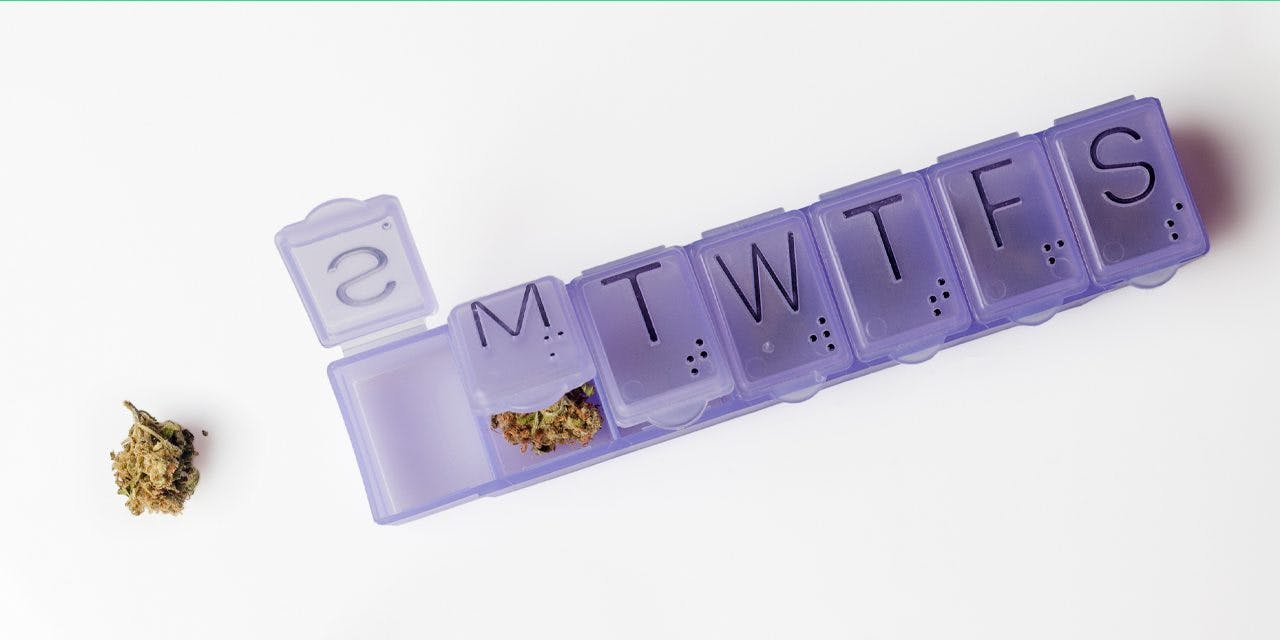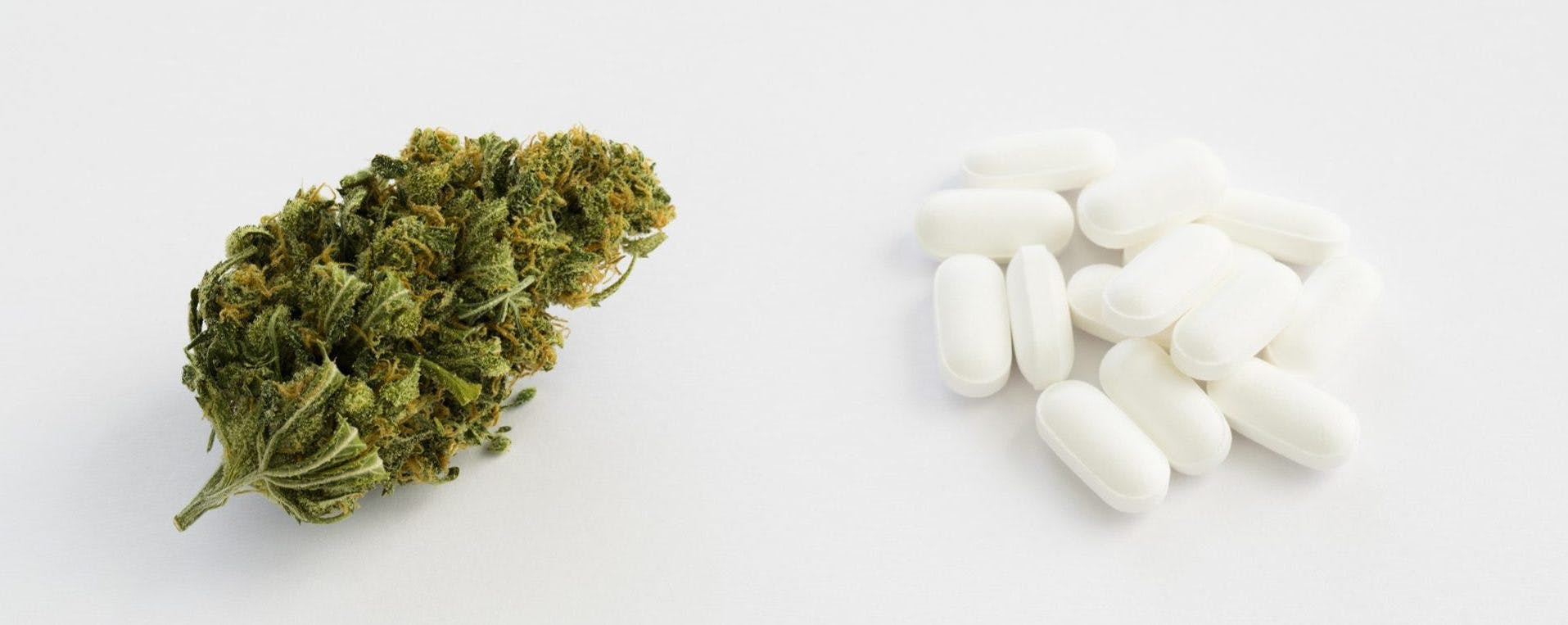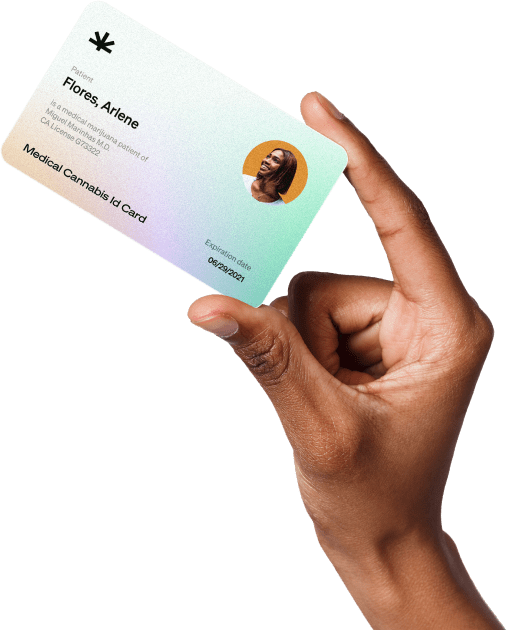How to Use Cannabis to Manage Pain

Article written by

Tina MagrabiSenior Content Writer
Content reviewed by

Dr. Lewis JasseyMedical Director - Pediatric Medicine
Pain is a highly complex concept that can manifest physically and emotionally. Chronic physical pain is often worsened by issues that cause mental anguish like anxiety and depression. Even the idea that you might not get better or relief from the current pain you’re in can make existing illness and suffering worse.
Yes, it’s important to treat the physical source of pain, but it is just as important to also treat the psychological, social and emotional symptoms that accompany the everyday challenge of dealing with chronic physical pain. Dame Cicely Saunders described this combination as “total pain“.
We have developed many medications to treat all of these different kinds of pain, including analgesics (e.g. Tylenol), non-steroidal anti-inflammatory drugs (NSAIDs e.g. ibuprofen), beta blockers, steroids, benzodiazepines, antidepressants and ultra-addictive opioids, just to name a few.
While some of these medications have their potential and practical uses, they all share the same massive downside: the potential for overdose, and when taken together they compound one another and make that potential overdose even more likely.
For this reason, cannabis can be an alternative (or complementary) to painkillers. Numerous scientific studies have demonstrated the healing ability of the cannabis plant, especially in terms of battling pain and inflammation. Medical cannabis may also reduce the need for many prescription medications, with many using it to replace opioids, benzodiazepines, antidepressants and many other types of drugs.
Learn how cannabis may be able to help manage and treat many types of pain, from arthritis to toothaches, and how you can integrate medical marijuana into your health regimen.
Get your medical marijuana card
Connect with a licensed physician online in minutes.
How Cannabis Helps Pain
While cannabis has been used as medicine for thousands of years before now, modern science helps us understand exactly how cannabis-derived medicine works on your brain, nerves and endocannabinoid system (ECS) to effectively treat a long list of health issues and qualifying conditions.
For example, due to the entourage effect and the variety of naturally-occurring cannabinoid compounds available in the cannabis plant, many different types of pain can be treated in one simple and safe medicine. This is because the various cannabinoids, terpenes and flavonoids in cannabis can target multiple receptor systems (e.g. cannabinoid, GABA, serotonin, dopamine, opioid) all at once.
Download Our Dosing Guide for Common Qualifying Conditions
Cannabis for Acute Pain
Acute pain is defined as sudden and intense discomfort. Unlike chronic pain, acute pain may only last for a day, or even just an hour. Headaches, backaches and muscle pain are among the most common types of acute pain that people experience. Research has shown that cannabis may be useful in treating these and other types of acute pain.

Headaches
Headaches and migraine are complex conditions, perhaps mostly due to the fact that no one really knows where they come from. However, some possible causes of headache are:
- Inflammation
- Irritation of blood vessels
- Head injuries
- Infection
- Tumors
- Stress
- Allergic reactions
- Dehydration
- An increase in intracranial pressure
- Sleep deprivation
- Gastrointestinal disorders
- An underlying neurological condition
- Overuse of medication
- Sensitivity to external stimuli
Whether there is a common cause of all types of headache is not known, but one theory is that headaches could be caused by lack of serotonin in the brain. A 2019 study in the Journal of Pain directly linked the use of cannabis with a 50 percent reduction of headache or migraine pain, with concentrates shown to be even more effective than just smoking cannabis flower.
Another 2019 retrospective study found that an astonishing 88.3 percent of 279 patient samples reported improvement in their headaches after using cannabis, with more than half experiencing less headache frequency and nearly 40 percent reporting improved, more restful sleep.
Back Pain
Some experts estimate that as many as 40 percent of people will experience sciatica in their lives. Many opt for treating that pain with acetaminophen (Tylenol/paracetamol), ibuprofen, aspirin or prescription painkillers like gabapentin or opioids, but medical cannabis and cannabidiol (CBD) is an effective and less addictive option. You’ll just need to figure out the dosage right for you.
You should ideally start off with a tincture high in CBD-to-THC ratio (e.g. 20:1, 18:1) in order to control for psychoactive effects, and then if that does not work, try a tincture with a different ratio (e.g. 9:1, 3:1, 1:1), working down in stages. You may also find that you prefer different ratios for different times of day (e.g. CBD-rich products during the day, and products containing more THC in the evening).
Joint and Muscle Pain
Scientists have discovered that cannabis could be beneficial in managing both joint and muscle pain. General pain in the knee and elbow joints, as well as minor muscle sprains, may respond well to a medical marijuana regimen.
Broken Bones
Breaking or fracturing a bone can lead to intense musculoskeletal pain. One 2020 study published in the journal Current Reviews in Musculoskeletal Medicine discussed the potential of cannabis to heal this challenging type of pain that can recur months or years after a broken bone heals.
Tooth Pain
Traditional Asian medicine has long used cannabis as a treatment for tooth pain related to dental disease or experienced after dental surgery. The combination of analgesic and anti-inflammatory effects of cannabis make the plant a strong candidate for managing toothaches.
Cannabis for Chronic Pain
Chronic pain can severely impact a person’s quality of life. Occurring constantly or sporadically but continually, chronic pain is associated with conditions such as fibromyalgia, neuropathy (nerve pain) and arthritis – all conditions medical cannabis may be particularly useful for.
The root cause of chronic pain may also be an injury, or a side effect of certain cancer treatments like chemotherapy. Cannabis has been shown to help people suffering from chronic pain find relief.
Fibromyalgia
Widespread musculoskeletal pain is common among people with fibromyalgia, a sometimes debilitating disorder that may also cause insomnia, fatigue and mood issues. Cannabis has been shown to help some people with fibromyalgia combat musculoskeletal pain with few reported adverse effects.
Neuropathy (Nerve Pain)
Neuropathy, severe pain that occurs in the nerve endings, may result from standard cancer treatments including chemotherapy. Some research and clinical trial results suggest that cannabis medicine could help people with cancer cope with neuropathic pain.
Arthritis
Arthritis causes pain and stiffness in the joints and is a condition that frequently becomes worse as people age. Thanks to the anti-inflammatory properties of cannabis, the plant may help relieve some types of arthritis, including rheumatoid arthritis and osteoarthritis due to long-term cartilage wear and tear.
Cannabis for Visceral Pain
Visceral pain is felt internally, deep beneath the surface. Unlike an acute headache, visceral pain can be chronic or occur cyclically, as is the case with menstrual cramps. Some data has revealed that medical marijuana may be able to help treat women’s medical conditions and other forms of visceral pain.
Irritable Bowel Syndrome (IBS)
Causing alternating constipation and diarrhea, irritable bowel syndrome (IBS) is an uncomfortable condition for millions of people. Cannabis may help people with IBS by reducing inflammation in the gut. Some promising research has also indicated that cannabis could reduce nausea and improve appetite in people with IBS.
Menstrual Pain
Premenstrual syndrome (PMS) can lead to sharp cramps and other uncomfortable symptoms for many women each month. Scant research exists on the connection between cannabis and PMS, but the plant’s potential to treat other types of visceral pain make it a possible painkiller for menstrual pain as well.
Endometriosis
Endometriosis occurs when endometrial tissue grows outside the womb, leading to severe visceral pain in women with this condition. Research is emerging on the ways that cannabis may be able to treat associated with endometriosis. One clinical trial at the Milton S. Hershey Medical Center in Pennsylvania is currently underway.
Cannabis for Mental & Emotional Pain
Emotional pain is perhaps the most underestimated and poorly understood type of pain. Painful emotional and psychological conditions like depression and anxiety are often comorbid with painful physical conditions like headaches. Research has indicated that cannabis and CBD may be able to reduce the symptoms of depression and anxiety, along with other conditions that cause pain to the psyche.
Depression
Up to one-third of people currently suffer from some form of depression, a statistic that has grown during the COVID pandemic. Some evidence points to the possibility that cannabis may help treat depression, while other data suggest the opposite – it seems that dosing is key, with cannabis being effective for depression in low or moderate doses.
Anxiety
Like the evidence behind cannabis for depression, there is much debate surrounding the use of marijuana for anxiety. Again, dosing seems to be key, with lower doses of THC having anti-anxiety effects and higher doses the opposite. Anxiety and depression often go hand-in-hand, as the two share similar biological mechanisms in the brain, so it is wise to go slow-and-low when dosing cannabis.
Post-Traumatic Stress Disorder (PTSD)
PTSD has complex emotional roots and can be challenging to treat, especially since the condition often goes undiagnosed. Some military veterans have used cannabis for PTSD with varying levels of success. Research on PTSD and cannabis is mixed, with scientists offering different recommendations dependent upon each individual. Medical cannabis may be an alternative to prescription benzodiazepines, which are actually ineffective for treating PTSD in the long-term yet still commonly prescribed.
Attention Deficit Hyperactivity Disorder (ADHD)
ADHD often begins in childhood and carries over into adulthood, leading to behavioral issues, notably the ability to focus. Some adults have successfully treated their ADHD with cannabinoids and medical marijuana. In some cases, medical marijuana has even reduced the need for other ADHD medications in adults with ADHD.
Other Types of Emotional Pain: Grief, Anger and Stress
Some people who use marijuana report feelings of euphoria. Such feelings could be useful when experiencing grief, anger or stress, but much more research is needed. However, we do know that stress and emotional pain such as grief are linked to the development of disease, so cannabis could be a useful tool if it is indeed able to manage these issues.
How to Treat Pain with Cannabis
Treating pain with cannabis or any other medicine is a highly individual endeavor, and because of this some studies may show medical cannabis to be effective in treating chronic pain, whereas others show more mixed results. However, there are some basic rules and tips you can use when starting a regimen of medical marijuana for pain.

Find the Right Variety of Cannabis and Cannabinoid-Terpene Profile (Chemotype)
Varieties (often miscalled “strains”) such as Gorilla Glue, White Rhino/Medicine Man, Super Silver Haze and Strawberry Cough may be good places to start, but the name alone does not necessarily tell you which strain has a high concentration of THC and other cannabinoids and terpenes – only testing can do this.
Terpenes like linalool, which is found in jasmine and is often used in massage and bath oils, can help aid relaxation. Other terpenes like myrcene contribute to cannabis’ sedative effects, and varieties higher in myrcene may be useful in helping people in pain get a good night’s sleep. Other terpenes, like beta-caryophyllene, have been shown to bind to CB2 receptors and help reduce pain and inflammation associated with many conditions (e.g. arthritis, diabetes).
There is some suggestion that CBD may reduce the amount of spasticity a person feels, and there is much evidence that CBD does seem to act as both an anticonvulsant and antispasmodic. THC, too, seems to help prevent spasms and therefore cramping. A combination of both THC and CBD has been shown to reduce spasticity in those with multiple sclerosis (MS).
Ingestion Method
Topicals and transdermals could be of use to treat localized nerve pain associated with back pain, alongside tinctures. CBD may also enhance healing in fractures, as CBD may help make bones stronger. When it comes to spinal injuries, as well as neuropathic pain (nerve pain), indicas were overwhelmingly preferred by patients in one study. CBD was also much sought-after. THC, which mimics anandamide, will likely also control inflammation.
Dosing
Check out our guide to dosing cannabis and the ten key things to consider. Speak with your doctor for the safest, most effective experience possible with cannabis medicine.
Frequency
Many people use medical marijuana on a daily basis to manage pain. Some people may fare better with just once per day, while others with more severe forms of pain may need to dose more regularly.
See what cannabis can do for your painful condition with a medical marijuana card. Leafwell’s qualified physicians are here to guide you through a simple online application process for an MMJ card.
Get Your Medical Card
Connect with a licensed physician online in minutes.
Frequently Asked Questions
Is marijuana a cure for chronic pain?
Marijuana is not a cure but rather a supplemental treatment option for pain. Many people have found relief from chronic pain through medical marijuana.
Which terpenes are best for pain?
As pain of all types tends to affect sleep, terpenes such as myrcene and linalool and the THC itself may be more helpful in getting to bed than looking at CBD alone. We already mentioned the power of the entourage effect, which boosts the power of cannabinoids when they’re used together. Indeed, high CBD levels may keep some people awake. Beta-caryophyllene also has many painkilling properties.
Is CBD oil as effective as cannabis itself for pain?
CBD oil is a popular and widely available (i.e.. legal) option for people experiencing pain and seeking natural treatment. However, the cannabinoid tends to work best in combination with other cannabinoids in cannabis, like THC. People with chronic pain tend to prefer balanced THC:CBD profiles. Together with terpenes and flavonoids, the entourage effect sets in and maximizes the therapeutic benefits of all chemical compounds in the mix.



